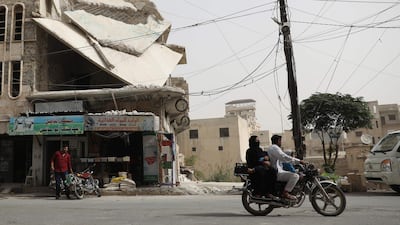When Russia and Turkey managed to stave off an all-out assault on Idlib, it raised hopes that the three million citizens trapped in the enclave might yet be spared the brutal consequences of a potentially catastrophic battle in the last rebel stronghold in Syria. But just weeks on, that deal looks increasingly precarious and the threat to innocent citizens, including one million children, looms as large as ever. For the Syrian people, the dreams once nurtured during the Arab uprisings nearly eight years ago have morphed into a nightmare. In 2011, as regimes crumbled in Tunisia, Egypt and Libya, the future seemed full of promise. More than half a million lost lives later, the only hope in Syria is that yet more lives will not be needlessly lost.
The three million people trapped in and around the north-western province of Idlib, many of them displaced from around the country, are helplessly awaiting the outcome of a stand-off between the Russian-backed forces of Bashar Al Assad and a disparate, squabbling group of some 75,000 opposition fighters, separated by the temporary demilitarised zone set up in the fragile agreement between Turkey and Russia. It is uncertain how long this stalemate can last. Some rebel forces, flouting the terms of the deal, seem determined to lock horns with the regime in a final, catastrophic assault. For his part, Mr Al Assad, stressing that the ceasefire is only temporary, is clearly champing at the bit to reach his endgame and restore his control over the entire country.
The global community carries a large share of responsibility for what happens next in Idlib. Russia could yet partially redeem itself in the eyes of the world by exercising responsible, humane statesmanship and rising above provocation. Turkey has at least played a part in this fragile ceasefire, albeit to serve its own purposes by protecting its own forces in the zone and averting the prospect of a million more refugees crossing into its territory. Western powers, which once promised to act when red lines were crossed, have all but resigned themselves to Mr Al Assad's triumph. Their only remaining concern appears to be that in his final victory he should not deploy chemical weapons – an ineffectual moral high ground given that the vast majority of Syria's dead have fallen to bullets and barrel bombs. But the immediate fate of those trapped in Idlib is now a matter for the consciences of all involved, from the regime and its sponsors to rebels such as Hayat Tahrir Al Sham, upon whom rests the fate of millions. Whatever the aspirations of the Syrian regime or of Russian ambitions in the region, the people of Syria have surely suffered enough. It must now be clear to all that a political solution is the only way to bring an end to the long, bloody and ultimately futile battle for Syria. The only question now is whether the last act in this protracted tragedy will end in an unexpected triumph of humanity over barbarity or in a bloodbath.

